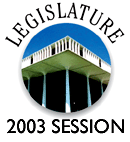
The state Senate indicated yesterday that it would stick by its plan to raise the general excise tax so it can restore cuts to education. Excise tax hike stays
alive in LegislatureA Senate panel backs a budget plan that
eliminates vacant jobs and taps special fundsBy Richard Borreca
rborreca@starbulletin.comThe Ways and Means Committee approved a complex new budget bill that drops an unspecified number of vacant state jobs and moves money from special funds to the general fund to balance the budget.
State money in special funds is dedicated for specific purposes and cannot be used for other state projects. Gov. Linda Lingle and legislators have been taking surplus funds from special funds to balance the budget.
Lingle had also asked for changes to the high-tech credit law, Act 221, after the state Council on Revenues lowered its estimates on tax collections because of fears that too much money would be lost to tax credits.
Legislature Directory
Legislature Bills & Hawaii Revised Statutes
But, after receiving a flood of testimony from supporters of the state's fledgling high-tech industry, the committee rejected Lingle's request.
Instead, the chairman, Sen. Brian Taniguchi (D, Moiliili-Manoa), recommended cutting state jobs that had been on the books but were vacant for 18 months. Even though no one was hired for those jobs, the positions were still counted as a state expense, according to the budget.
The committee also let stand Lingle's proposed $2.7 million cut to adult education programs.
Last month, the House Finance Committee approved a two-year, $7.6 billion general fund budget that is $14.3 million less than what Lingle proposed. The changes made to that budget yesterday cut another $36 million, according to Taniguchi.
The total budget for fiscal 2004 is $3.7 billion, which is about $200 million above the budget for this fiscal year.
The proposed fiscal 2005 budget is $3.9 billion. Most of the increases are due to automatic state worker pay increases.
Yesterday, Taniguchi said that while his proposal to raise the general excise tax to 4.5 percent from 4 percent is not needed to balance the budget, some of the extra money it would generate -- $80 million -- would go for either new education programs or to restore cuts to education.
The tax bill includes a $100 food tax credit to "soften the blow" of the increase.
Lowell Kalapa, executive director of the Tax Foundation of Hawaii, criticized the proposed increase.
"It should be remembered that by raising the general excise tax rate, the cost of all goods and services, including food, will go up," Kalapa said.
"For all the Legislature's recent and ongoing attempts to revitalize the state's economy, this measure takes 10 steps back," Kalapa told the senators yesterday.
He also disagreed with legislators who decided to keep the high-tech tax credits intact.
"Those tax incentives have insured that the tax burden remains high on all other taxpayers," Kalapa said.
